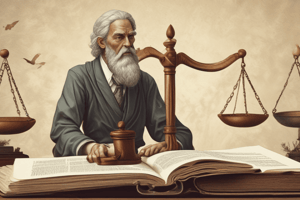Podcast
Questions and Answers
What is the principle denoted by the rule of law?
What is the principle denoted by the rule of law?
- Society is governed by changing norms
- Equality before the law regardless of various factors (correct)
- Society is governed by arbitrary power
- Equality before the law based on wealth
What is the role of interpreters in legal systems?
What is the role of interpreters in legal systems?
- Govern actions within specified territories
- Create statutes
- Clarify ambiguous provisions and apply laws to new situations (correct)
- Adjudicate disputes
Which of the following is not one of the essential pillars of the jurisdictional edifice?
Which of the following is not one of the essential pillars of the jurisdictional edifice?
- Interpretation
- Adjudication
- Execution (correct)
- Legislation
Which theory advocates 'the greatest good for the greatest number'?
Which theory advocates 'the greatest good for the greatest number'?
What aspect does examining the philosophy of law involve?
What aspect does examining the philosophy of law involve?
What is the command theory proposed by John Austin?
What is the command theory proposed by John Austin?
What is the main idea behind legal realism in jurisprudence?
What is the main idea behind legal realism in jurisprudence?
What do proponents of critical legal studies (CLS) critique in conventional legal scholarship?
What do proponents of critical legal studies (CLS) critique in conventional legal scholarship?
What insight does traversing the domain of jurisprudence impart?
What insight does traversing the domain of jurisprudence impart?
What is the advice given regarding exploring the philosophy of law?
What is the advice given regarding exploring the philosophy of law?
Flashcards are hidden until you start studying
Study Notes
Unraveling Jurisprudence: Exploring the Philosophy of Law
Jurisprudence is more than just a study of laws; it's a deep dive into the underlying principles and philosophical foundations that shape legal systems worldwide. This exploration encompasses several significant facets, including the philosophy of law—an intellectual pursuit aimed at understanding the very nature, sources, and limits of our legal institutions. Let's delve into some of these critical aspects.
Legal Positivism vs Natural Law Theory
Two principal theories occupy center stage when discussing jurisprudential philosophy: legal positivism and natural law theory.
Legal positivists maintain that laws are solely derived from human constructs such as legislative acts, judicial decisions, or international conventions. They assert that there must exist a clear distinction between positive law—the formal rules we live by—and moral values like justice or fairness.
Conversely, natural lawyers argue that morality underpins all legislation and jurisprudence. For them, the ultimate standard of right and wrong is not manmade but inherent to the universe itself. While many natural lawyers believe this ideal order can reveal itself through divine revelation, others propose that reason alone might unlock the universal truths guiding our legal systems.
The Concept of Justice
The concept of justice lies at the heart of any discussion involving philosophy of law. Numerous models emerge from various ideologies, providing different perspectives on how societies should structure themselves and their legal systems. These theories range from Aristotle's classical idea of distributive justice to utilitarian theories advocating "the greatest good for the greatest number." Modern approaches include John Rawls' theory of justice and Robert Nozick's libertarian viewpoint.
Rule of Law
Rule of law denotes the principle whereby society is governed by established norms rather than arbitrary power. It underscores the importance of stable laws within a well-functioning democracy, ensuring equality before the law regardless of race, class, gender, wealth, or political affiliation. A strong rule of law framework lays the groundwork necessary for effective governance, promoting social cohesion among diverse peoples while safeguarding individual rights and freedoms.
Legislation, Adjudication, and Interpretation
These three concepts - legislation, adjudication, and interpretation – constitute essential pillars upon which jurisdictional edifice rests. Legislators create statutes intended to govern actions and behaviors within specified territories while judges adjudicate disputes according to applicable laws. Moreover, interpreters play a vital role in clarifying ambiguous provisions and applying laws to new situations. All together, they work hand in hand to keep legal systems functioning smoothly.
In conclusion, delving into the philosophy of law means examining questions regarding the nature, origins, and purpose behind legal systems. By exploring fundamental ideas like legal positivism versus natural law, justice theories, rule of law, and the roles played by legislation, adjudication, and interpretation, students and scholars alike discover fascinating insights into what makes our legal systems tick.
Studying That Suits You
Use AI to generate personalized quizzes and flashcards to suit your learning preferences.




